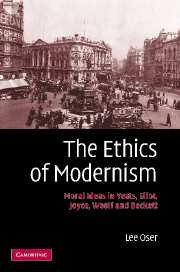Book contents
- Frontmatter
- Contents
- Acknowledgments
- Introduction: literature and human nature
- 1 W. B. Yeats: out of nature
- 2 T. S. Eliot: the modernist Aristotle
- 3 James Joyce: love among the skeptics
- 4 Virginia Woolf: Antigone triumphant
- 5 Samuel Beckett: humanity in ruins
- Conclusion: technology and technique
- Notes
- Works Cited
- Index
2 - T. S. Eliot: the modernist Aristotle
Published online by Cambridge University Press: 22 September 2009
- Frontmatter
- Contents
- Acknowledgments
- Introduction: literature and human nature
- 1 W. B. Yeats: out of nature
- 2 T. S. Eliot: the modernist Aristotle
- 3 James Joyce: love among the skeptics
- 4 Virginia Woolf: Antigone triumphant
- 5 Samuel Beckett: humanity in ruins
- Conclusion: technology and technique
- Notes
- Works Cited
- Index
Summary
A completely ironic poet passes beyond the realm of poetry into an inscrutable solipsism. After discovering the master ironist Jules Laforgue, the young Eliot grew more and more inscrutable himself. From the start of the manuscript poems in Inventions of the March Hare, objects and routines pile up, without the possibility of an action to resolve their significance. The ironically titled “Convictions (Curtain Raiser)” opens the collection with scenes of marionettes, including some knightly marionettes who discourse on moral philosophy:
And over there my Paladins
Are talking of effect and cause,
With “learn to live by nature's laws!”
And “strive for social happiness
And contact with your fellow-men
In reason: nothing to excess!”
As one leaves off, the other begins.
Funny as it is to hear “learn to live by nature's laws!” from the mouth of a puppet, the joke comes at a high cost to the poet. He dwells in a world of suffocating convention, from which he is liberated only in mind. His mindless cast airs its “convictions,” overheated platitudes recorded by the poet with an occasional parenthesis, which marks the small difference of his freedom: “My marionettes (or so they say) / Have these keen moments every day.” Trapped by the same formalities of meter and manner, the poet and his marionettes bear a family resemblance. They dramatize his dilemma of what to say and do, as he studies the human mechanism and its moral repertoire.
- Type
- Chapter
- Information
- The Ethics of ModernismMoral Ideas in Yeats, Eliot, Joyce, Woolf and Beckett, pp. 44 - 64Publisher: Cambridge University PressPrint publication year: 2007



